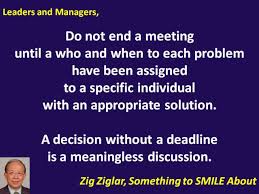'Tis the Season...
 Well, not really THE season, but it is...
Well, not really THE season, but it is...
The Business Planning Season for working on, discussing, talking through, arguing about and spreadsheeting over and over again various strategic business plans, tactical department plans and the ever-important sales and marketing activity plans.
Ultimately, every sales account plan, every marketing strategy and activity plan, every hiring plan, financial plan and product development plan will roll up to be your company's 2016 business plan. Perfect in its creation and, somewhat by definition of what it is-a plan after all-flawed in its forecasted end points. My own rule of thumb is that if the plan was met perfectly an entire 12-14 months later from its creation, then the management team probably didn't stretch themselves far enough.
Another good concept to carry into this business and sales planning season are the quotes from Eisenhower and Patton who both noted that the planning process itself is much more important than the actual plan that results
What we do know in "The Rhythm of Business" is that these three months represent the most exciting time of the year...
- Crunching through the blocking and tackling of making Q4's sales forecast
- Working through the complexities and intricate timing of an assemblage of strategies and tactics
- Balancing the practicality of creating achievable plans while realizing the need to grow more than
- Figuring out the issues of hiring and ramp-to-productivity speeds along with retention percentages
- ...and then there's all the math: waterfall math, product development math and finally ebidta math
Just an exciting, crazy time of year followed by the reward of taking a couple of days off for "the holidays", and then, as a friend of mine, Ray Bixler, CEO of SkillSurvey, a superbly-run company, often says, it's Wash-Rinse & Repeat for the next year.
Given that, in addition to our "Day Jobs", most of us over the next three months will spend countless hours in planning meetings in hotels with no windows and eating buffet food and warmed over pizzas, I thought that it might be helpful to share in this blog five of my most favorite rules for planning sessions that just might help you through this season. There are actually "My Favorite 10 Rules", but I thought that for impact (and for content for my blog next week), I would try split these up into Five Rules this week and Five Rules next.
As a firm, we're involved in a couple of hundred planning sessions every year, so over a period of 25 years, we've accumulated a fair amount of Planning Session Best Practices both through solid results and a few... "well, let's never try that again" moments.
1. Objectives & End Points
 It's critical to define right up front what you and the rest of the planning team are attempting to achieve in terms of specific objectives and even more specific End Point Deliverables at the end of the planning process.
It's critical to define right up front what you and the rest of the planning team are attempting to achieve in terms of specific objectives and even more specific End Point Deliverables at the end of the planning process.
The answer btw to the question of "What are our detailed objectives in this planning process" should not and cannot be... "we need to deliver a plan to the board in December". That's simply a guidepost. The much more critical issue is to get absolute agreement among all of the members of the Planning Team as to why you're doing this as managers, and how you'll use the process and its outputs during 2016
2. Pre-Meeting 1 on 1 Meetings
 Whoever is running and facilitating the meeting needs to have one-on-one, confidential, face-to-face, meetings with everyone who will be in the planning meetings, i.e.-"The Planning Team". The purpose of these meetings is to understand, one-on-one, what the objectives are for each of the individuals who will be attending as part of the planning team.
Whoever is running and facilitating the meeting needs to have one-on-one, confidential, face-to-face, meetings with everyone who will be in the planning meetings, i.e.-"The Planning Team". The purpose of these meetings is to understand, one-on-one, what the objectives are for each of the individuals who will be attending as part of the planning team.
These comments will then serve as the backbone to create the draft agenda that needs to be circulated.
3. The Agenda
 Get out an agenda marked in BOLD CAPITALS with the word "DRAFT", about two weeks before the meeting. Explain that this draft agenda is based on the one-on-ones that have taken place, and if anyone wants to edit or add to the agenda, they should circulate their comments and direct them back to the meeting facilitator who will then respin and recircuate a second draft to everyone on the Planning Team. In this way, everyone is involved and consensus is reached...at least for the agenda.
Get out an agenda marked in BOLD CAPITALS with the word "DRAFT", about two weeks before the meeting. Explain that this draft agenda is based on the one-on-ones that have taken place, and if anyone wants to edit or add to the agenda, they should circulate their comments and direct them back to the meeting facilitator who will then respin and recircuate a second draft to everyone on the Planning Team. In this way, everyone is involved and consensus is reached...at least for the agenda.
The agenda should be divided into rough time blocks such as "first half of the morning, and "after lunch" and should never be forced into artificial times such as " 3:00 start discussion on long term vision". Having said that, the agenda must include...
- Hard start times. You might want to have "breakfast available at 7:30:, but The Hard Start is at 8:30, and that's exactly what it is. Everyone's there; no excuses about the traffic, and it's time to start the meeting. We always employ "The Derby Rule" in every meeting: Last person into the room after the appointed time, owes everyone else $5.00. We use it in every planning meeting, every board meeting and just about every meeting everywhere. And, yes, we collect the money there, which is then donated to a charity of the managers' choosing.
- Break times. Plan in two 15 minute breaks: one at 10:30 and one at 2:30 plus a 45 minute lunch break at 12:15. Back at it at 1:00
- End times. Typically are going to be between 5:00 and 6:00 largely depending on whether the meeting is one day or two days. At the end of the meeting, before everyone jumps in the car, make sure that there is a time to deacclimate over appetizers and a drink. If you are planning on dinner together, do not make it a working dinner
4. Facilitation
 It's like the warning superimposed on the video of the guy jumping off the edge of a cliff on his snowboard-"Don't try this without expert supervision" . A good facilitator...
It's like the warning superimposed on the video of the guy jumping off the edge of a cliff on his snowboard-"Don't try this without expert supervision" . A good facilitator...
- frees up management to contribute
- makes sure everyone is "equal"
- is the traffic cop
- is the note taker
- is the logistics czar
- provides exercises when things get bogged down
Bottom line, if you're on the planning team, contribute as a manager rather than trying to be "the guy standing by the easel holding the marking pens"
5. Ends of Meetings
 I thought that this image from the Great Sales Coach Zig Ziglar was appropriate here
I thought that this image from the Great Sales Coach Zig Ziglar was appropriate here
At the end of every meeting day make sure that you allow a full hour, no matter how late it is or how exhausted everyone says that they are and go through all of the key points of the day's discussions.
- Make sure that there is total agreement on whatever the discussion points were
- When there was no total agreement, note that down also and define what the next steps need to be
- Create a table in real time of what the next steps are, who is responsible and the timing agreed to
Typically, the meeting notes are going to be taken during the meeting in real time on the overhead projector so that everyone can coalesce around the key agreements and "next steps". Within 24 hours following the meeting, those same notes need to be circulated in draft form to all of the members of the planning team
So, that's it for a start.
Hope this is helpful, as we enter into the season. Any questions, or want to know more, just schedule a call with us.
If you want a more detailed read of what it takes to create a full business plan for either your emerging or well-established business, you can click on to the download noted to the right and get a free copy of our 100 page "Writing the Winning Business Plan". We had fun writing and editing this, and hope that you will have fun reading it. Let us know what you think!
Jack's Rules:
- Plan Once,
- Check the Plan Twice.
- Work the Plan...the way you planned it.
- Questions?
- Go back and check the Plan.
Have specific business or sales planning questions that you want to bounce off me or other Derby Coaches, just email me, and we'll set a time to talk at the end of a day.

Derby Management...for 25 years
-Sales & Marketing Productivity Experts
-Business & Strategy Planning Specialists
-Senior Management Coaching for CEOs & VPs
Box 171322, Boston, MA 02117
617-292-7101
Jack's Cell: 617-504-4222

